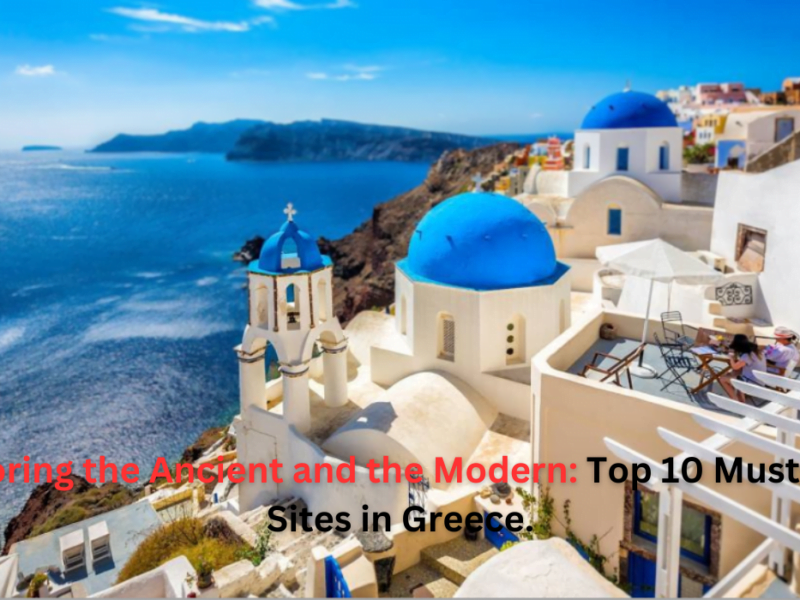Greece is a land where history whispers from ancient ruins, marvels at its ruins, and modern life flows through bustling streets. It offers a tapestry of experiences that attracts travellers from all over the world.
Every step you take in the country that gave birth to Western civilization is a journey through history. Boundless curiosity and a spirit of exploration never take hold as you wander around ancient temples, theatres, stadiums and cities. You’ll around buildings and temples constructed at least two-and-a-half thousand years ago: the Acropolis, Delphi, Knossos, Mycenae, and Olympia… among the sites that embody the spirit and grandeur of Ancient Greece.
The beauty of Greece doesn’t need any introduction. The Greek gods have designed their country with utter perfection. There are many tourist places to visit in Greece that are simply awe-inspiring. Beautiful landscapes and sceneries will leave you spellbound, delicacies and beverages will gladden your foodie soul, and locals will have many enchanting stories and local folklore for you. Greece is a destination that looks right out of a fairytale. Be it any season any month – Greece and the Greeks never fail to impress.
Greece has abundant historical sites that provide a detailed understanding of ancient civilization dating back to 1600 B.C. Among these sites, the Acropolis of Athens, the Meteora Monasteries, the Delphi Ruins, and several others are all important historical landmarks in Greece.
In this comprehensive guide, we delve on a journey to explore the top 5 must-visit sites and Historical Attractions In Greece, promising an adventure that weaves through the heart of its ancient past and the soul of its modern present.
Table of Contents
The Five Best Historical Sites In Greece:-
Acropolis Of Athens
If there’s one monument that symbolises ancient Greece, it’s the Acropolis in Athens. This ancient citadel sits high above the modern capital on a rocky outcrop. Hence, the name ‘acropolis’ roughly translates to ‘the highest point in the city’. It dates back to the 5th century B.C. and was the preeminent sanctuary in Athens for many centuries.
If you’re visiting Athens, don’t miss the chance to see this renowned UNESCO World Heritage site. It’s an iconic landmark that’s definitely worth your time and offers a stunning visual experience. It is a mesmerizing treat for anybody who enjoys history through their lens and is curious to understand the ancient Greek ruins. You can learn more about this old Greek site by visiting the Acropolis Archaeological Museum.
The most essential Parthenon, the Acropolis of Athens, is an archaeological site nestled on a hill, showcasing the timeless beauty of this ancient city of Athens. For your visual pleasure, a visit to the Acropolis Museum, which houses artefacts of the great city structure ruins from this site, can provide insights into the early history of Greece. Afterwards, proceed to the Ancient Agora, a well-known gathering place and most favoured destination in the ancient city, situated on the northwest side of the Acropolis.
Meteora Monasteries
The Meteora Monasteries, located in Thessaly on the Greek mainland, are situated on enormous rock formations that were formed through unique geological processes millions of years ago. Visiting Meteora, a UNESCO World Heritage site, is one of the most peaceful activities to do in Greece.
Six of the 24 monasteries constructed on these towering rock formations by monks who first settled here in the 11th century are still functioning. Although ascending these rocky outcrops might be challenging, it is undoubtedly worth it. We recommend booking a monastery tour to make things easier. The monasteries are just a ten-minute car ride away from Kalabaka.
Olympia
As the birthplace and renowned as the origin of the Olympic Games, Olympia is undoubtedly one of Greece’s most famous ancient sites. The world’s foremost sports competition, Olympia, has had a global impact. For over a millennium, the games took place here until their abolishment in AD 393 by Emperor Theodosius I. Honouring Zeus; the Olympic games featured athletic events where olive branches were the only prizes. The Olympic flame still burns at the location.
Situated on the Peloponnese peninsula, Olympia’s preservation has suffered during its history. Various earthquakes and the ordered destruction by Theodosius II have attempted to wipe out this magnificent site. However, much of this World-Heritage-listed sanctuary’s former glory is still evident today. The Ancient Stadium, the workshop of Phedias, the Palaestra and the temples of Zeus and Hera can all be seen.
Delphi
No matter your interest in archaeology or ancient Greece, Delphi is awe-inspiring. Athens may have been the capital, but Delphi was regarded as the ‘centre of the world’. The Delphi Ruins, one of the most famous ancient sites, are Greece’s most significant shrine. It was a revered location for the ancient Greek God Apollo and housed the priestess Pythia and the Oracle of Delphi, which historians believe dates back to 1400 B.C.
According to ancient Greek beliefs, Delphi was the earth’s geographical centre. Delphi, the UNESCO World Heritage Site is located on the side of Mount Parnassus and provides a fascinating insight into Greek history.It is one of Greece’s most important archaeological sites and is breathtaking to behold..
Delphi served as the seat of the famous High Priestess, known as Pythia, who was consulted as an oracle. The area grew wealthy as a multitude of people throughout the ancient world travelled here for cryptic predictions and guidance.
At its heart is the Sanctuary of Apollo – one of the ancient Greeks’ most essential gods and son of Zeus. The site also boasts the Sanctuary of Athena and the stadium that held the predecessor of the modern-day Olympics – the Pythian Games. What today is a UNESCO World Heritage Site, Delphi, was Greece’s cultural and religious centre for centuries and the ultimate symbol of unity.
Theatre Of Epidaurus
One of the most prominent Greek historical sites, the Theatre of Epidaurus is a Greek amphitheater tucked away in the Epidaurus hills, a two-hour drive southwest of Athens. In its prime, it could accommodate 14,000 people seated in 55 rows of limestone seats and was renowned for its reverberation of sounds. The theatre was designed To provide the best possible acoustics for the audience, there are several ways to experience it firsthand!
The theatre slope was expertly crafted into a hillside bowl. This theatre and its nearby healing centre have been proven to be an essential part of healing and medicine in ancient cities, as experiencing entertainment and music through music was believed to have medicinal therapeutic effects.
Famous for its Ancient Theatre, Epidaurus has drawn crowds since its construction in the late 4th century BC. It was initially built to host ceremonies honouring the God of medicine, Asclepius.
As we know, it is one of the best-preserved examples of classic Greek theatre; this famous venue is still being used today. Performances of ancient Greek drama can be booked during the annual Athens and Epidaurus Festival.
Conclusion
In conclusion, Greece is a land steeped or, can say, carved out in history, where every step you take is a journey through time. From the Acropolis of Athens to the Meteora Monasteries, the Delphi ruins to the birthplace and the originator of the Olympic Games in Olympia, the Greece is home to some of the most awe-inspiring and mesmerizing historical attractions in the world. Exploring the rich ancient past of Greece is an experience that is to be noticed, and it is sure to leave you spellbound. So, pack your bags and embark on an adventure that weaves through the heart of its ancient past and the soul of its modern present.
For the latest travel-related information, we recommend checking out sleekroamer.com.










